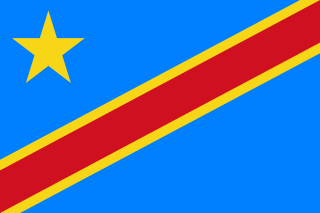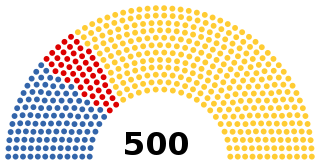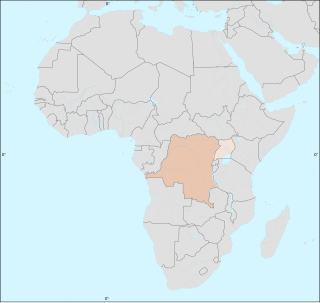
The economy of the Democratic Republic of the Congo has declined drastically since the mid-1980s, despite being home to vast potential in natural resources and mineral wealth.

The Democratic Republic of the Congo (DRC), also known as Congo-Kinshasa, DR Congo, the DROC, or simply either Congo or the Congo, and historically Zaire, is a country in Central Africa. It is, by area, the largest country in sub-Saharan Africa, the second-largest in all of Africa, and the 11th-largest in the world. With a population of around 90 million, the Democratic Republic of the Congo is the most-populous officially Francophone country in the world, as well as the 2nd-most populous country in Africa, and the 13th-most populous country in the world. Since 2015, the Eastern DR Congo has been the scene of an ongoing military conflict in Kivu.

South Kivu is one of 26 provinces of the Democratic Republic of the Congo. Its capital is Bukavu.
Panzi Hospital in Bukavu, the capital of the Sud-Kivu province in the Democratic Republic of the Congo. It specializes in treating survivors of violence, the large majority of whom have been sexually abused. After years of military rape in South Kivu, there is increased civilian adoption of sexual violence.

The National Assembly is the lower house and main legislative political body of the Parliament of the Democratic Republic of the Congo. It was established by the 2006 constitution.
The Archdiocese of Kinshasa is an archdiocese of the Roman Catholic Church in the Democratic Republic of the Congo. Its ecclesiastic territory includes the capital city of Kinshasa and surrounding districts. The archdiocese is the metropolitan see for the Ecclesiastical Province of Kinshasa. The current archbishop is Fridolin Ambongo Besungu.
The Roman Catholic Archdiocese of Mbandaka-Bikoro is the Metropolitan See for the Latin Rite Ecclesiastical province of Mbandaka-Bikoro, in the western part of Democratic Republic of the Congo. It is under the authority of the Congregation for the Evangelization of Peoples.
The Roman Catholic Diocese of Mbujimayi is a Latin diocese in the Democratic Republic of the Congo's Kasai Oriental province. It is a suffragan in the Ecclesiastical province of Kananga.
The Roman Catholic Diocese of Kikwit is a diocese located in the city of Kikwit in the Ecclesiastical province of Kinshasa in the Democratic Republic of the Congo.
The Roman Catholic Diocese of Kongolo is a Latin suffragan diocese in the Ecclesiastical province of Lubumbashi in the Democratic Republic of the Congo.

Hélène Mambu-ma-Disu is a Congolese public health expert, physician, pediatrician and United Nations diplomat. She served as a Regional Adviser for the African regional office of the United Nations' World Health Organization, and later went on to serve for 18 years as a World Health Organization Resident Representative in several countries in the region, before retiring in 2008. She is currently Senior Program Officer for the Sustainable Immunization Financing Program of the Sabin Vaccine Institute, for whom she coordinates field activities in Democratic Republic of the Congo, Republic of the Congo, and Madagascar.

Health problems have been a long-standing issue limiting development in the Democratic Republic of the Congo.

Masi-Manimba Territory is an administrative area of Kwilu province, Democratic Republic of the Congo. Its headquarters are in the town of Masi-Manimba, on the Lukula River, a tributary of the Kwilu River. The Luie and Kafi rivers also run from south to north through the territory, tributaries of the Lukula. The territory is divided into ten sectors: Bindungi, Kibolo, Kinzenga, Kinzenzengo, Kitoy, Masi-Manimba, Mokamo, Mosango, Pay-Kongila and Sungu.

Masi-Manimba is a town in Kwilu Province, Democratic Republic of the Congo, the headquarters of the Masi-Manimba Territory. As of 2012 the population was estimated to be 31,802.
Lubero Territory is a territory in North Kivu, Democratic Republic of the Congo.
Agence et Messageries Aérienne du Zaïre (AMAZ), formerly Agence et Messageries Aérienne du Congo (AMAC), was a Zairean airline. It had its headquarters at Aérodrome de N'Dolo in Kinshasa. The carrier was formed in the 1960s to take over some services flown by Cogeair, and provided feeder services to Air Zaïre. It ceased operations in the late 1970s.

In 2014, an outbreak of Ebola virus disease in the Democratic Republic of the Congo (DRC) occurred. Genome sequencing has shown that this outbreak was not related to the 2014–15 West Africa Ebola virus epidemic, but was of the same EBOV species. It began in August 2014 and was declared over in November of that year, after 42 days without any new cases. This is the 7th outbreak there, three of which occurred during the period of Zaire.

Kwilu District was a district of the Belgian Congo and the Democratic Republic of the Congo. It roughly corresponded to the present province of Kwilu.

The 2018 Équateur province Ebola outbreak occurred in the north-west of the Democratic Republic of the Congo (DRC) from May to July 2018. It was contained entirely within Équateur province, and was the first time that vaccination with the rVSV-ZEBOV Ebola vaccine had been attempted in the early stages of an Ebola outbreak, with a total of 3,481 people vaccinated. It was the ninth recorded Ebola outbreak in the DRC.

The Kivu Ebola epidemic began on 1 August 2018, when four cases of Ebola virus disease (EVD) were confirmed in the eastern region of Kivu in the Democratic Republic of the Congo (DRC). The Kivu outbreak also affected Ituri Province, whose first case was confirmed on 13 August, and in June 2019, the virus reached Uganda, having infected a 5-year-old Congolese boy who entered Uganda with his family, but was contained. In November 2018, the outbreak became the biggest Ebola outbreak in the DRC's history, and by November, it had become the second-largest Ebola outbreak in recorded history, behind only the 2013–2016 Western Africa epidemic. On 3 May 2019, nine months into the outbreak, the DRC outbreak death toll surpassed 1,000.












